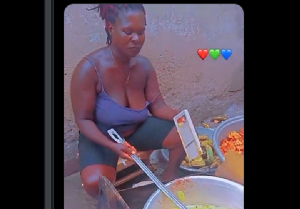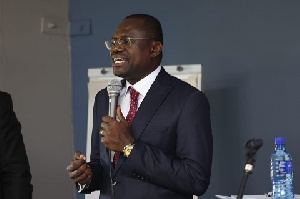It would appear that we, Ghanaians, and Africans as a whole, are possessed with grovelling characteristic of a sordid mind which hates anything quality, but rather prefer to worship mediocrity.
Thus, our leaders, having first-hand knowledge of our servile deference, continue to take us for granted.
Some of us could hardly comprehend how and why any subtle mind would argue somewhat forcefully, albeit impetuously that facts and figures are not the determinants of a blossoming economy. How ironic?
How can any trained mind claim inanely that Ghana’s economy under former President Mahama (3.4% growth and 15.4% inflation) cannot match President Akufo-Addo’s record before the insidious coronavirus (8.6% growth and 7.5% inflation)?
Well, we have to admire the never ending histrionics of the well-to-do politicians, many of whom own luxurious mansions and ‘disparate’ luxurious vehicles (Toyota Land Cruisers, Lexus, Range Rovers etc.), who more often than not, join the lumpen proletariats (the downtrodden), and staged a ‘weeping’ session, apparently, in protest of perceived high socio-economic living standards.
It is quite ironic that the NDC operatives can muster the courage and persistently accuse President Akufo-Addo of not fixing the NDC administration’s 96 months massive economic mess in barely 50 months into 96 months mandate.
In fact, any honest critic can attest to the fact that Akufo-Addo is steadily fixing the huge mess left by the Mahama’s administration.
The fact however remains that Akufo-Addo, before the unspeakable coronavirus, moved the economic growth from 3.4% under Mahama in 2016 to around 8.6%. While the inflation stood at around 7.5% as compared to 15.4% under Mahama in 2016.
So, how can anyone clamour inexorably for the return of someone who wilfully collapsed Ghana’s economy?
It is well-documented that “during the year 2001, just before the NPP administration took over, debt as a percentage of the GDP was not only unsustainably high and crippling but also deprived Ghanaians from money which could have been used for needed developmental and social projects”.
The fact though, is, the benefits of the HIPC were “unprecedented during the Kufuor’s regime from (2001-2008).
Macroeconomic indicators begun to stabilize and Ghana’s debt stock was significantly reduced by about $4 billion within that period (BOG).
There were Rapid infrastructural developments as well as social and policy reforms. Ghana was then moved from an HIPC economy to a middle income economy under the Kufuor administration (Mutaka Alolo, 2012).
By the end of 2008, Ghana's economy had been quadrupled to US$ 28 billion, a period of eight years under the NPP administration. The average GDP growth of the NDC from 1993-2000 was 3.8% while that of the NPP from 2001-2008 was5.2% with economic growth reaching 6.3% in 2007 (Daily Guide, 2016).
Disappointingly, however, during the Mills/Mahama’s eight years, they managed to uproot the good foundation laid by President Kufuor and his NPP administration.
Take, for example, under Mahama’s government, Ghana’s total debt ballooned from GH¢9.5 billion to a staggering GH¢122.4 billion by the end of December 2016 with a little to show for.
This means that about 93% (i.e. GHC113 billion) of Ghana’s total debt since independence was accumulated under NDC government from 2009-2016.
It is however important to note that the previously single digit inflation and budget deficit doubled astronomically.
To be quite honest, Ghana went into the throes of economic collapse due to the calamitous errors in decision-making under the leadership of Ex-President Mahama.
Take, for example, Ghana’s economic growth slowed for the fourth consecutive year to an estimated 3.4% in 2015 from 4% in 2014 as energy rationing (dumsor), high inflation, and ongoing fiscal consolidation weighed on economic activity (World Bank, 2016).
Moreover, the high inflation rate remain elevated at 18.5% in February 2016 compared to 17.7% in February 2015, even after the Central Bank’s 500 bps policy rate hikes (the inflation stood at 15.8 per cent as of October 2016).
Besides, President Mahama’s coarse government dragged the economic growth from around 14 per cent in 2011 to around 3.4 per cent as of December 2016.
Gratifyingly, however, before the insidious coronavirus, the Akufo-Addo’s government efficiently raised the economic growth. Ghana’s economy grew provisionally by 8.5 percent in 2017 compared to 3.7 percent in 2016 (Ghana Statistical Service, 2018).
Candidly, Ghana’s economic growth, just before the pernicious coronavirus, stood at around 8.6% from 3.4% in December 2016.
Interestingly, in the first two years of the Akufo-Addo’s administration, the Industry sector recorded the highest growth rate of 16.7 percent, followed by Agriculture 8.4 percent and the Services 4.3 percent.
Services share of GDP decreased from 56.8 percent in 2016 to 56.2 percent in 2017. The sector's growth rate also decreased from 5.7 percent in 2016 to 4.3 percent in 2017.
However, two of the subsectors in the services sector recorded double-digit growth rates, including Information and Communication 13.2 percent and Health and Social Work 14.4 percent.
The Industry sector, the highest growing sector with a GDP share of 25.5 percent, had its growth rate increasing from -0.5 percent in 2016 to 16.7 percent in 2017.
The Mining and Quarrying subsector recorded the highest growth of 46.7 percent in 2017.
The Agriculture sector expanded from a growth rate of 3.0 percent in 2016 to 8.4 percent in 2017. Its share of GDP, however, declined from 18.7 percent in 2016 to 18.3 percent in 2017. Crops remain the largest activity with a share of 14.2 percent of GDP.
The Non-Oil annual GDP growth rate decreased from 5.0 percent in 2016 to 4.9 percent in 2017. The 2017 Non-oil GDP for industry recorded a growth rate of 0.4 percent, compared with 4.9 percent in 2016. Growth in the fourth quarter of 2017 reached 8.1 percent compared to 9.7 percent in the third quarter (GNA, 2018).
With all due respect, spare us the melodrama, because it was under the erstwhile NDC administration that Ghana came under the throes of economic collapse.
K. Badu, UK.
k.badu2011@gmail.com
Opinions of Sunday, 4 April 2021
Columnist: Kwaku Badu















